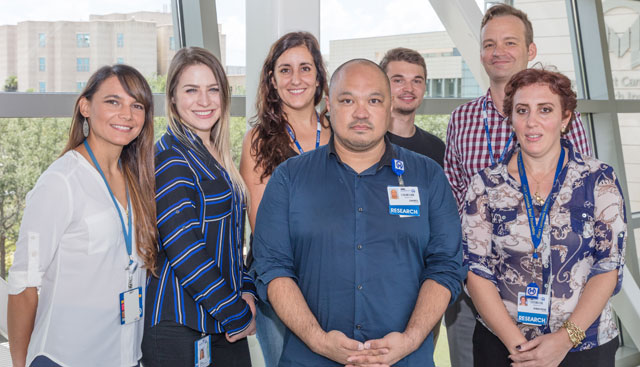
Research Spotlight: Dr. Abate-Daga Discusses the Progress of Immunotherapy
Dr. Daniel Abate-Daga's research is focused on the development of T cell-based immunotherapies for the treatment of cancer and the translation of those preclinical findings into clinical application.
You were one of our first recruits in the area of CAR-T. What attracted you to our center?
Moffitt is a very prestigious institution, especially in the field of immunotherapy. Before visiting Moffitt for the first time, I was already familiar with the successful TIL program established by Drs. [Shari] Pilon-Thomas and [Amod] Sarnaik. During my first visit, I was impressed by its research infrastructure, its collaborative philosophy and its commitment to providing high-quality service to its patients. The possibility of joining forces with scientists, clinicians and surgeons to facilitate the translation of our lab-based results into a clinical reality was key in my decision to join the institution.
You are on the basic side of CAR-T. Tell us a little bit about your research and how you collaborate with physicians.
We apply a basic science approach to ask clinically relevant questions. Over the last few years, the number of patients treated with CAR-T cells has grown exponentially. However, our understanding of their ultimate mechanism of action is incomplete. We are motivated to dissect the immunobiological and molecular elements of the CAR-T cell machinery because our aim is to use that information to design the next generation of CARs, which will have improved features and superior therapeutic efficacy. In collaboration with Dr. Eric Haura and the Proteomics Core, we have successfully implemented a method based on mass spectrometry to map the biochemical events triggered by CARs within the T cells. We found that the mere presence of these synthetic immune receptors on the surface of a T cell dramatically alters the biological properties of the lymphocytes in unexpected ways. We are currently manipulating the design of our CARs to capitalize this newly discovered biology. We conduct virtually all our experiments using primary human cells, using the same viral vectors and constructs as those used in the clinic to maximize the potential for clinical translation. My team collaborates actively with physicians from multiple departments at Moffitt, which allows us to keep the translational focus while we provide technology (including immune receptors) and research tools tailored to the needs of their disease of interest.
Immunotherapy is getting a lot of press. What excites you about the field from a basic science viewpoint?
Indeed! I have been working in this field for a number of years now, which allowed me to be part of a very exciting process. When I started, the cancer immunotherapy community was rather small, and the field was regarded with certain skepticism by oncologists and immunologists. During my postdoctoral training at the NCI, my mentor, Steve Rosenberg, together with James Kochenderfer reported the first clinical success of an anti-CD19 CAR. These results were replicated in other centers and the whole field started growing ever since. On a daily basis, research gives me the opportunity to satisfy my scientific curiosity, digging into the fundamental processes that govern life and combining my two main interests: immunology and gene therapy. At the same time, the hope of having our work impact the lives of cancer patients is what gets me out of bed every morning.
You are originally from Argentina, what was it like growing up there? How did it influence your career choice in research?
Argentina, like the U.S., is a melting pot, so I grew up exposed to multiple cultural influences, in addition to the geographical diversity of the country. My parents nurtured my interest in traveling and my curiosity for the unknown, which is likely the reason I became a scientist. My very personal definition of being a scientist is being systematically (and professionally) curious. My career path was also highly influenced by the outstanding professors who taught the immunology courses that I took in college. They were extremely dedicated and managed to transmit their knowledge and also their passion for research. As most scientists from my country, I find inspiration in the outstanding achievements of an Argentine Nobel Laureate, César Milstein, who developed the technique to generate monoclonal antibodies.
What do you do to recharge after long days of research?
I enjoy cooking and sharing a meal with friends. I am also a photography enthusiast and an avid traveler. One of the aspects of my career path that I appreciate the most is having had the opportunity to live in different countries (Argentina, Spain, U.S.), experience new cultures and work with people from all over the world.
